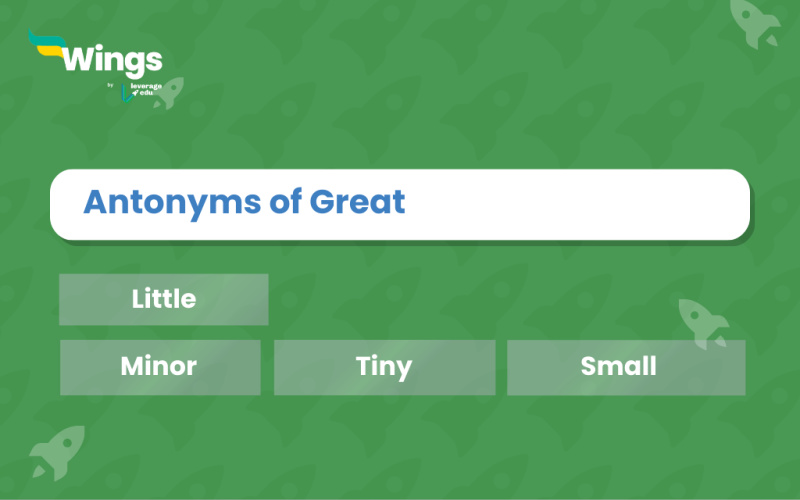Antonyms play a pivotal role in improving reading and writing skills because they help to understand the meaning of unfamiliar words. Let us try to discern the contrasts of great in order to enhance our English proficiency. Some of the opposites of great are little, minor, and inessential.

Etymology and Meaning of Great
The word great originated from the Middle English “greet”, meaning great, large, and from Old English meaning big, coarse, thick, or massive. The word great is an adjective that describes things that are good, large, or important.
Also Read: 110+ Antonyms
5+ Opposites of Great
Let’s delve deep to understand the opposites of great. They are mentioned below:
- Little
- Minor
- Inessential
- Small
- Insignificant
- Tiny
Must Read: Antonyms of Stare, Meaning and Examples
Antonyms of Great Examples With Usage
The term great is often objective and can be differentiated depending on the context and perspective of the speaker.
Let us understand the following examples of using the antonyms of great in a sentence:
- Little: There is a little water left in the pitcher.
- Minor: She had met with a minor surgery.
- Inessential: Please stop talking about inessential things.
- Small: Her small baby is too pretty.
- Insignificant: We will talk about these insignificant things later.
- Tiny: I met a tiny little girl yesterday.
Must Read: Antonyms of Captive Meaning and Examples
Antonyms of Great Quiz
1. Select the most appropriate antonym for the great.
A Marvelous
B Massive
C Miniature
D Stupendous
Answer: Stupendous
2. Which word is the antonym of the great?
A Astounding
B Trivial
C Enormous
D Amazing
Answer: Trivial
Explore More Exciting Reads Below
This was all about the antonym of “great” meanings and examples. Hope you are well versed with the term great and its usage. For more such blogs, follow Leverage Edu.


 One app for all your study abroad needs
One app for all your study abroad needs












 60,000+ students trusted us with their dreams. Take the first step today!
60,000+ students trusted us with their dreams. Take the first step today!